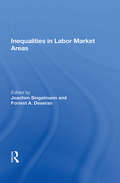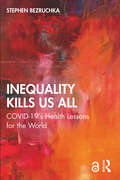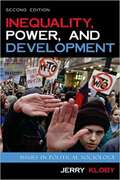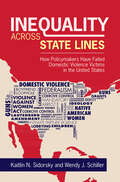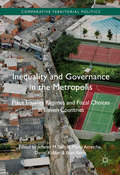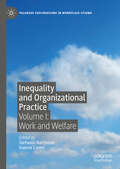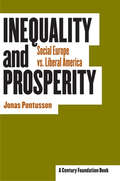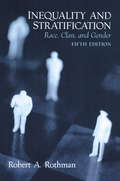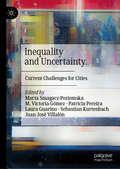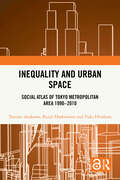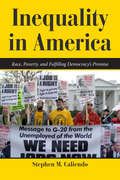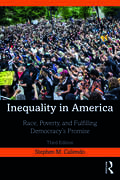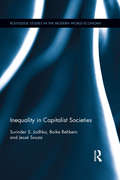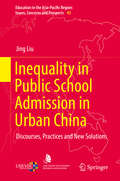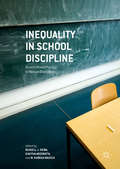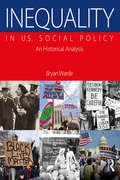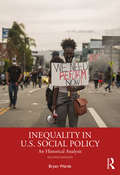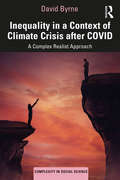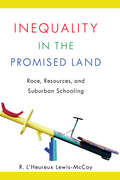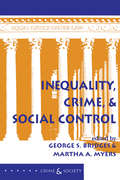- Table View
- List View
Inequality In Labor Market Areas
by Joachim SingelmannDuring the past two decades, many attempts have been made to refocus stratification research and the study of inequality. The contributors to this volume have a long-term concern with the importance of space and locality. Many of them belonged to a research project during the early 1980s that had as one of its main aims the analysis of labor force
Inequality Kills Us All: COVID-19's Health Lessons for the World
by Stephen BezruchkaThe complex answer to why the United States does so poorly in health measures has at its base one pervasive issue: The United States has by far the highest levels of inequality of all the rich countries. Inequality Kills Us All details how living in a society with entrenched hierarchies increases the negative effects of illnesses for everyone. The antidote must start, Stephen Bezruchka recognizes, with a broader awareness of the nature of the problem, and out of that understanding policies that eliminate these inequalities: A fair system of taxation, so that the rich are paying their share; support for child well-being, including paid parental leave, continued monthly child support payments, and equitable educational opportunities; universal access to healthcare; and a guaranteed income for all Americans. The aim is to have a society that treats everyone well—and health will follow.
Inequality Power and Development: The Task of Sociology
by Jerry KlobyThe growth of transnational corporations, the dominance of worldwide financial and political institutions, and the extensive influence of media that are nearly monopolized by corporate interests are key factors shaping our global society today. What are the consequences of these developments for the great masses of people throughout the world? One clearly emerging pattern is the growing disparity between the developed nations and the rest of the world.In this excellent analysis of power distribution and its effects, sociologist Jerry Kloby presents data on the increase of wealth and income inequality, and argues that many of the policies pursued by the developed nations and international corporations have led to a deterioration of living standards and the environment in many parts of the world. He also discusses a power shift in the United States that has weakened the working class.One of the great strengths of Kloby's work is the comprehensive picture he creates from many diverse events and trends―local and international, contemporary and historical. The many graphs and tables containing supporting data add a visual element that guides the reader to a clear understanding of the complex forces underlying contemporary developments. He also clearly explains the meaning and relevance of such sophisticated but important terms as neoliberalism, dependency, civil society, and social capital.This fully revised and updated edition will have enduring value for students and scholars of sociology, political science, economics, and international relations.
Inequality across State Lines: How Policymakers Have Failed Domestic Violence Victims In The United States
by Wendy J. Schiller Kaitlin N. SidorskyInequality and Governance in the Metropolis
by Jefferey M. Sellers Marta Arretche Daniel Kübler Eran RazinThis book undertakes the first systematic, multi-country investigation into how regimes of place equality, consisting of multilevel policies, institutions and governance at multiple scales, influence spatial inequality in metropolitan regions. Extended, diversified metropolitan regions have become the dominant form of human settlement, and disparities among metropolitan places figure increasingly in wider trends toward growing inequality. Regimes of place equality are increasingly critical components of welfare states and territorial administration. They can aggravate disparities in services and taxes, or mitigate and compensate for local differences. The volume examines these regimes in a global sample of eleven democracies, including developed and developing countries on five continents. The analyses reveal new dimensions of efforts to grapple with growing inequality around the world, and a variety of institutional blueprints to address one of the most daunting challenges of twenty-first century governance.
Inequality and Organizational Practice: Volume I: Work and Welfare (Palgrave Explorations in Workplace Stigma)
by Valerie Caven Stefanos NachmiasBringing together international authors, this edited collection addresses the need for greater inclusivity within organizational policy and practice, in order to tackle both visible and invisible inequalities amongst employees. Evidence suggests that more positive employment relationships can be brought about by tackling diversity issues, yet there are still ‘grey areas’ existing in the current legislative framework. Volume I explores the way that these hidden inequalities can be used to identify an individual as ‘other,’ and how this ultimately affects their wellbeing and welfare at work. Analysing social justice and stigma, as well as nuanced issues within the workplace, this book is a thought-provoking read for scholars of HRM, practitioners and policy-makers.
Inequality and Prosperity: Social Europe vs. Liberal America (Cornell Studies in Political Economy)
by Jonas PontussonWhat are the relative merits of the American and European socioeconomic systems? Long-standing debates have heated up in recent years with the expansion of the European Union and increasingly sharp political and cultural differences between the United States and Europe. In Inequality and Prosperity, Jonas Pontusson provides a comparative overview of the two major models of labor markets and welfare systems in the advanced industrial world: the "liberal capitalist" system of the United States and Britain and the "social market" capitalism of northern Europe. These two models balance concerns of efficiency and equity in fundamentally different ways. In the 1990s the much-heralded forces of globalization (together with demographic changes and attendant political pressures) seemed to threaten the very existence of the social-market economies of Europe. Were the social compacts of Sweden and Germany outmoded? Would varieties of capitalism remain possible, or were labor-market and social-welfare arrangements converging on the U.S. norm? Pontusson opposes the notion of inevitable convergence: he believes that social-market economies can survive and indeed flourish in the contemporary world economy. He bases his argument on an enormous amount of highly specialized research on eighteen countries, using national-level data for the last thirty years. Among the areas he explores are labor-market dynamics, income distribution, employment performance, wage bargaining, firm-level performance, and the changing possibilities for the welfare state.
Inequality and Stratification: Race, Class, and Gender
by Robert A. RothmanFor undergraduate courses in Social Stratification, Race, Class, and Gender, and Introduction to Gender Studies. Using a concise and easy-to-understand style, this text provides an integrated approach to the implications of social class, race and ethnicity, and gender-explaining how each relates to economic, social, and political inequality.
Inequality and Uncertainty: Current Challenges for Cities
by Sebastian Kurtenbach Marta Smagacz-Poziemska M. Victoria Gómez Patrícia Pereira Juan José Villalón Laura GuarinoIt is not possible to ignore the fact that cities are not only moving, vibrant and flourishing spaces, promising hope for better quality of life, but that they also accumulate and reflect significant problems. This book explores the relational and dynamic nature of urban inequalities, including their visible and invisible forms. By using the rather elusive term of ‘uncertainty’, the authors zoom in on specific aspects of urban inequalities that are difficult to measure, yet are acutely sensed and experienced by people and, more and more often, perceived as unfair. Here, in the recognition of inequalities as unjust and in the disagreement with the status quo, lies a positive aspect of uncertainty, which can lead to a social awakening and more active citizenship.
Inequality and Urban Space: Social Atlas of Tokyo Metropolitan Area 1990–2010
by Tatsuto Asakawa Kenji Hashimoto Yuki HiraharaAsakawa, Hashimoto and Hirahara explores the widening inequality and its social consequences in Tokyo Metropolitan area by using two approaches, one from social class and social stratification theory and the other from urban sociology.The book uses social atlases to visualize the socio-spatial structure of Tokyo, the most populous metropolitan area in the world using the analysis from the 1990, 2000 and 2010 National Census data. Until the 1970s, Japanese society had relatively small economic disparity between social classes. Today, Japan is a society of great inequality, with a huge number of people with low socio-economic status and many problems caused by poverty. The socio-spatial structure of thirty years of widening inequality in the metropolitan Tokyo area, which is fraught with many social problems, such as urban polarization, emergence of underclasses and health disparities are explored in this book. The structure and dynamics of class disparities among Tokyo Metropolitan area residents is also analyzed. Overall, this book visualizes three decades of widening inequality.A vital resource for researchers, graduate students, undergraduates, urban policy makers and urban planners who are interested about Tokyo as a metropolis in East Asia and those keen on understanding the widening inequality and its social consequences in Tokyo Metropolitan area.
Inequality in America
by Stephen M. CaliendoWhy does inequality have such a hold on American society and public policy? And what can we, as citizens, do about it? Inequality in America takes an in-depth look at individual-level and systemic inequality, focusing in particular on race, poverty, and gender, across a wide range of issues from housing and education to crime, employment and health. Caliendo explores how individual beliefs and attitudes can affect public opinion and lawmakers’ policy solutions and how the systemic barriers to advancement that result from these policies can then contribute to individual perceptions#151;creating a cycle of disadvantage and advantage that can be difficult to break, though not impossible. Feature boxes throughout the book highlight key public figures who have worked to combat inequality and offer suggestions for individual action. Concise and accessible, Inequality in America paves the way for students to think critically about the effects of the attitudes, behaviors and structures of inequality.
Inequality in America
by Stephen M. CaliendoWhy does inequality have such a hold on American society and public policy? And what can we, as citizens, do about it? Inequality in America takes an in-depth look at individual-level and systemic inequality, focusing in particular on race, poverty, and gender, across a wide range of issues from housing and education to crime, employment and health. Caliendo shows how individual-level prejudice and systemic inequality are interrelated, how individual beliefs and attitudes can affect public opinion and lawmakers’ policy solutions and how systemic barriers to advancement as a result of these policies then contribute to individual perceptions, creating a cycle of disadvantage and advantage that can be difficult to break, though not impossible. Feature boxes throughout the book offer insight into key public figures who have worked to combat inequality and suggestions for individual action. Concise and written in an accessible manner, Inequality in America paves the way for students to think critically about the effects of the attitudes, behaviors and structures of inequality.
Inequality in America: Race, Poverty, and Fulfilling Democracy's Promise
by Stephen M. CaliendoWhy does inequality have such a hold on American society and public policy? And what can we, as citizens, do about it? Inequality in America takes an in-depth look at race, class and gender-based inequality, across a wide range of issues from housing and education to crime, employment and health. Caliendo explores how individual attitudes can affect public opinion and lawmakers' policy solutions. He also illustrates how these policies result in systemic barriers to advancement that often then contribute to individual perceptions. This cycle of disadvantage and advantage can be difficult-though not impossible-to break. "Representing" and "What Can I Do?" feature boxes throughout the book highlight key public figures who have worked to combat inequality and encourage students to take action to do the same. The second edition has been thoroughly revised to include the most current data and to cover recent issues and events like the 2016 elections and the Black Lives Matter movement. It now also includes a brand-new chapter on crime and criminal justice and an expanded discussion of immigration. Concise and accessible, Inequality in America paves the way for students to think critically about the attitudes, behaviors and structures of inequality.
Inequality in America: Race, Poverty, and Fulfilling Democracy's Promise
by Stephen M. CaliendoWhy does inequality have such a hold on American society and public policy? And what can we, as citizens, do about it? Inequality in America takes an in-depth look at race, class, and gender-based inequality across a wide range of issues from housing and education to crime, employment, and health. Caliendo explores how individual attitudes can affect public opinion and lawmakers’ policy solutions. He also illustrates how these policies result in systemic barriers to advancement that often then contribute to individual perceptions. This cycle of disadvantage and advantage can be difficult—though not impossible—to break. "Representing" and "What Can I Do?" feature boxes highlight key public figures who have worked to combat inequality and encourage students to do the same. The third edition has been thoroughly revised to include the most current data and cover recent issues and events such as Trump Administration policies, the #MeToo movement, and U.S. Supreme Court decisions affecting issues of racial representation and voting rights. Concise and accessible, Inequality in America paves the way for students to think critically about the attitudes, behaviors, and structures of inequality. New to the Third Edition New to the Third Edition Considers the heightened discussion of racial reckoning that has been occurring since the summer of 2020. Covers the disproportional effect to communities of color of the Covid-19 global pandemic and related recession Takes an early glimpse into Biden Administration priorities compared to Trump Administration policies on education, immigration, housing and urban development. Updates feature boxes, including a spotlight on U.S. Representative Alexandria Ocasio-Cortez and Bryan Stevenson of the Equal Justice Initiative. Discusses the January 6, 2021 riot at the U.S. Capitol, the #MeToo and #TimesUp Movements, and much more.
Inequality in Britain
by Alan WareThis book provides a thorough and engaging analysis of inequality in Britain, including its long-term development and transformation since the beginning of the 20th century. The author argues that inequality is not what it used to be – no longer can policy-makers consider it just in terms of status, wealth and income. Having resurfaced strongly as an issue after the financial crisis of 2007–2008, a truly informed discussion of inequality must now be wide ranging and take account of a variety of interacting factors. They include both a radically different role for education in the labour market and the interests of future generations. Government policies, market failures and fundamental changes in British society and economy in earlier decades have all contributed to inequality’s contemporary scope, its intensity and who it affects. Alan Ware traces and illuminates the altered nature of inequality in Britain, its consequences and especially its political implications. It offers a timely, concise and illuminating examination that will be of interest to all those concerned about inequality and, more broadly, to scholars and students of sociology, social/public policy, contemporary British history, political sociology and political theory.
Inequality in Capitalist Societies (Routledge Studies in the Modern World Economy)
by Boike Rehbein Surinder S. Jodhka Jessé SouzaInequality is one of the most discussed topics of our times. Yet, we still do not know how to tackle the issue effectively. The book argues that this is due to the lack of understanding the structures responsible for the persistence of social inequality. It enquires into the mechanisms that produce and reproduce invisible dividing lines in society. Based on original case studies of Brazil, Germany, India and Laos comprising thousands of interviews, the authors argue that invisible classes emerge in capitalist societies, both reproducing and transforming precapitalist hierarchies. At the same time, locally particular forms of inequality persist. Social inequality in the contemporary world has to be understood as a specific combination of precapitalist inequalities, capitalist transformation and a particular class structure, which seems to emerge in all capitalist societies. The book links the configurations to an interpretation of global domination as well as to symbolic classification.
Inequality in Public School Admission in Urban China: Discourses, Practices And New Solutions (Education in the Asia-Pacific Region: Issues, Concerns and Prospects #43)
by Jing LiuThis book explores and interprets discourses and practices in school admissions to public lower secondary education in urban China by utilizing a discourse analysis approach and a case study method. It identifies continuities and changes in discourses shaped by diverse forces in public lower secondary school admissions in the context of China’s social transformation from a profit-driven society to a more equitable society, and elucidates the power relationships among stakeholders in public school admissions by analysing their interplay in the process. More importantly, it exposes how current socio-economic, institutional and educational systems are shaping the engagement of stakeholders in the public school admissions process. It also presents some on-going projects intended to yield new policies and practices for more equitable public secondary education in China in the development stage of the post-2015.
Inequality in School Discipline
by Russell J. Skiba Kavitha Mediratta M. Karega RauschThis edited volume fills a critical void by providing the most current and authoritative information on what is known about disciplinary disparities. School exclusion--out-of-school suspension and expulsion in particular--remains a substantial component of discipline in our nation's schools, and those consequences continue to fall disproportionally on certain groups of learners. The negative consequences of frequent and inequitable use of school exclusion are substantial, including higher rates of academic failure, dropout, and contact with the juvenile justice system. As educators, policymakers, community leaders, and other youth-serving organizations begin the difficult work of creating more equitable school disciplinary systems, the need for effective disparity-reducing alternatives could not be more important. Drawing on the multi-year ground-breaking work of the Discipline Disparities Collaborative, the chapters in this book provide cutting edge knowledge supporting a new national imperative to eliminate race, gender, disability, and sexual orientation-based disciplinary disparities.
Inequality in U.S. Social Policy: An Historical Analysis
by Bryan WardeIn Inequality in US Social Policy: An Historic Analysis, Bryan Warde illuminates the pervasive and powerful role that social inequality based on race and ethnicity, gender, immigration status, sexual orientation, class, and disability plays and has historically played in informing social policy. Using critical race theory and other structural oppression theoretical frameworks, this book examines social inequalities as they relate to social welfare, education, housing, employment, health care, and child welfare, immigration, and criminal justice. This book will help social work students?better understand the origins of inequalities that their clients face.??
Inequality in U.S. Social Policy: An Historical Analysis
by Bryan WardeIn the second edition of Inequality in U.S. Social Policy: An Historic Analysis, Bryan Warde illuminates the pervasive and powerful role that social inequality based on race and ethnicity, gender, immigration status, sexual orientation, class, and disability plays and has historically played in informing social policy. Using critical race theory and other structural oppression theoretical frameworks, this book examines social inequalities as they relate to social welfare, education, housing, employment, health care, and child welfare, immigration, and criminal justice. With fully updated statistics throughout, and an examination of the impact of the COVID-19 pandemic on the United States, this new edition addresses the mammoth political and social changes which have affected inequality in the past few years. Inequality in U.S. Social Policy will help social work students better understand the origins of inequalities that their clients face, as well as providing an introduction for other social science students.
Inequality in a Context of Climate Crisis after COVID: A Complex Realist Approach (Complexity in Social Science)
by David ByrneInequality in a Context of Climate Crisis after COVID uses a complex realist approach to examine the crisis of three interconnected problems: economic inequality, climate change, and the COVID-19 pandemic. Widely acknowledged as the key driver of political discontent and social instability, economic inequality across high and middle-income countries is profoundly interconnected with climate change. Both of these issues are now set within the particularly acute context of COVID-19 and its aftermath. Confronting the crisis of these inherently interwoven issues is now the major problem for all political and governance systems. This book uses a complex realist frame of reference to understand the character of social-cultural-economic-political-ecological systems. It gives us a vocabulary and modes of thinking to confront these societal challenges and inform future action. Contributing to our thinking about dynamic social systems, this text deploys complex realism to understand our trajectory towards increasing inequality. It puts complexity to work in addressing fundamental social issues in a context of climate crisis after COVID-19. This book will be of interest to students and scholars across the social sciences, in particular to those studying social inequality, climate change, heterodox economics, complex systems, and Master's students in prgrammes with an applied focus. It will be of use to policymakers and practitioners.
Inequality in the Promised Land: Race, Resources, and Suburban Schooling
by R. L'Heureux Lewis-McCoyNestled in neighborhoods of varying degrees of affluence, suburban public schools are typically better resourced than their inner-city peers and known for their extracurricular offerings and college preparatory programs. Despite the glowing opportunities that many families associate with suburban schooling, accessing a district's resources is not always straightforward, particularly for black and poorer families. Moving beyond class- and race-based explanations, Inequality in the Promised Land focuses on the everyday interactions between parents, students, teachers, and school administrators in order to understand why resources seldom trickle down to a district's racial and economic minorities. Rolling Acres Public Schools (RAPS) is one of the many well-appointed suburban school districts across the United States that has become increasingly racially and economically diverse over the last forty years. Expanding on Charles Tilly's model of relational analysis and drawing on 100 in-depth interviews as well participant observation and archival research, R. L'Heureux Lewis-McCoy examines the pathways of resources in RAPS. He discovers that—due to structural factors, social and class positions, and past experiences—resources are not valued equally among families and, even when deemed valuable, financial factors and issues of opportunity hoarding often prevent certain RAPS families from accessing that resource. In addition to its fresh and incisive insights into educational inequality, this groundbreaking book also presents valuable policy-orientated solutions for administrators, teachers, activists, and politicians.
Inequality in the United States: A Reader
by John BrueggemannFor courses in Inequality, Social Stratification, and Social Problems. A thoughtful compilation of readings on inequality in the United States. The main objective of this text is to introduce students to the subject of social stratification as it has developed in sociology. The central focus is on domestic inequality in the United States with some attention to the broader international context. The primary goal of the text is to offer an understanding of the history and context of debates about inequality, and a secondary goal is to give some indication as to what issues are likely to arise in the future.
Inequality, Crime, and Social Control (Crime and Society)
by George S BridgesThis book brings together the most recent advances in theory and research on the relationship between social inequality and the control of criminal behavior.
Inequality, Grievances, and Civil War
by Lars-Erik Cederman Kristian Skrede Gleditsch Halvard Buhaug Lars-Erik Cederman Kristian Skrede GleditschThis book argues that political and economic inequalities following group lines generate grievances that in turn can motivate civil war. Larks-Erik Cederman, Kristian Skrede Gleditsch, and Halvard Buhaug offer a theoretical approach that highlights ethnonationalism and how the relationship between group identities and inequalities are fundamental for successful mobilization to resort to violence. Although previous research highlighted grievances as a key motivation for political violence, contemporary research on civil war has largely dismissed grievances as irrelevant, emphasizing instead the role of opportunities. This book shows that the alleged non-results for grievances in previous research stemmed primarily from atheoretical measures, typically based on individual data. The authors develop new indicators of political and economic exclusion at the group level, and show that these exert strong effects on the risk of civil war. They provide new analyses of the effects of transnational ethnic links and the duration of civil wars, and extended case discussions illustrating causal mechanisms.
